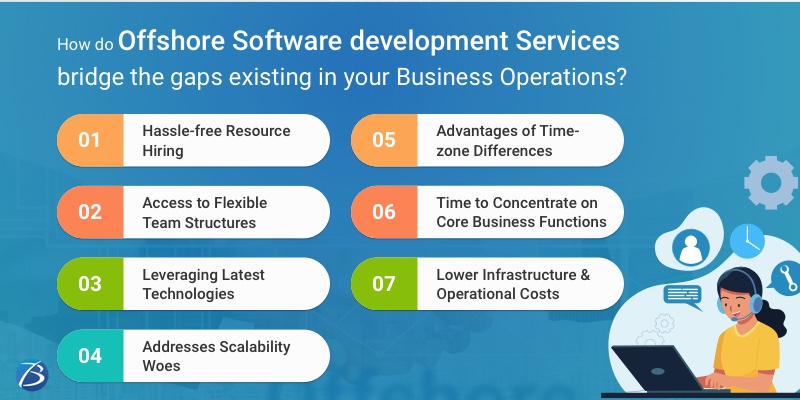Offshore outsourcing software development opens up a world of opportunities for companies looking to enhance their operations and stay ahead in the digital age. With the right strategies and considerations, businesses can leverage global talent to drive success.
Introduction to Offshore Outsourcing Software Development
Offshore outsourcing in software development refers to the practice of hiring a third-party company located in a different country to handle the development of software projects. This strategy allows businesses to access a global talent pool, reduce costs, and focus on their core competencies.
Benefits of Offshore Outsourcing
- Cost Savings: Offshore outsourcing can significantly reduce labor costs, as companies can hire skilled developers from countries with lower wage rates.
- Access to Global Talent: By outsourcing offshore, businesses can tap into a diverse pool of talented professionals with specialized skills and expertise.
- Increased Efficiency: Offshore outsourcing allows companies to accelerate project timelines by leveraging the round-the-clock development cycles across different time zones.
- Focus on Core Activities: Outsourcing software development tasks enables businesses to focus on their core activities and strategic initiatives, leading to increased productivity.
Challenges of Offshore Outsourcing, Offshore outsourcing software development
- Cultural and Language Barriers: Communication issues due to cultural differences and language barriers can impact project collaboration and understanding.
- Data Security Concerns: Offshore outsourcing raises concerns about data security and intellectual property protection, requiring robust measures to safeguard sensitive information.
- Quality Control: Ensuring the quality of work delivered by offshore teams can be challenging, as companies may face issues related to code standards and project management.
- Time Zone Differences: Coordinating work schedules across different time zones can lead to delays in communication, decision-making, and project progress.
Factors to Consider Before Offshore Outsourcing: Offshore Outsourcing Software Development

Before deciding to outsource offshore, companies should carefully consider several key factors to ensure a successful partnership and project completion. One of the most crucial aspects is cultural compatibility, followed by the assessment of technical capabilities of offshore software development teams.
Cultural Compatibility in Offshore Outsourcing Partnerships
Cultural compatibility plays a significant role in the success of offshore outsourcing partnerships. It is essential to ensure that the working styles, communication methods, and business practices of both parties align to avoid any misunderstandings or conflicts. Building a strong relationship based on mutual respect and understanding can lead to smoother collaboration and improved project outcomes.
Assessing Technical Capabilities of Offshore Software Development Teams
Before outsourcing software development offshore, companies must thoroughly evaluate the technical capabilities of the offshore teams. This includes assessing their expertise, experience, track record, and the technologies they specialize in. Conducting interviews, reviewing past projects, and requesting demos or samples of their work can help in determining if the offshore team has the required skills and qualifications to meet the project requirements effectively.
Best Practices in Offshore Outsourcing

Effective communication, robust project management, and data security are essential for successful offshore software development projects. Here are some best practices to consider:
Effective Communication Strategies
Effective communication is key when working with offshore teams. Establish regular communication channels such as video calls, emails, and project management tools to ensure everyone is on the same page. Provide clear instructions, set expectations, and encourage open dialogue to address any issues promptly.
Establishing a Robust Project Management Process
Having a strong project management process is crucial for the success of offshore projects. Define project goals, milestones, and timelines clearly from the outset. Use project management tools like Jira or Trello to track progress, assign tasks, and monitor deadlines. Conduct regular meetings to discuss progress and address any challenges.
Ensuring Data Security and Confidentiality
Data security is a top priority when outsourcing software development. Implement robust security measures such as encryption, secure VPNs, and access controls to protect sensitive data. Sign non-disclosure agreements with offshore partners to ensure confidentiality. Regularly audit and monitor data access to prevent unauthorized breaches.
Trends in Offshore Outsourcing Software Development

In today’s rapidly evolving technological landscape, offshore outsourcing software development continues to adapt and respond to various trends that shape the industry. From the emergence of new technologies to the impact of global events, the offshore outsourcing sector is constantly evolving to meet the changing needs of businesses worldwide.
Emerging Technologies in Offshore Outsourcing
The latest technologies such as cloud computing, Internet of Things (IoT), blockchain, and machine learning are significantly influencing offshore outsourcing practices. These technologies enable more efficient collaboration, advanced data analytics, and innovative solutions that drive business growth and competitiveness.
Impact of COVID-19 on Offshore Outsourcing Trends
The COVID-19 pandemic has accelerated the adoption of remote work and virtual collaboration, leading to a surge in offshore outsourcing activities. Companies are increasingly relying on offshore teams to maintain business continuity, reduce costs, and access specialized skills. This shift towards remote work is likely to continue shaping the offshore outsourcing landscape in the post-pandemic era.
Automation and Artificial Intelligence in Offshore Software Development
Automation and artificial intelligence (AI) are revolutionizing offshore software development practices by streamlining processes, improving efficiency, and enhancing the quality of deliverables. AI-powered tools and automation technologies enable developers to automate repetitive tasks, reduce manual errors, and focus on more strategic aspects of software development, leading to faster time-to-market and higher productivity.
Final Conclusion
As technology continues to evolve, offshore outsourcing software development remains a key strategy for businesses seeking competitive advantages. By embracing best practices and staying informed about trends, companies can navigate the complex landscape of global software development with confidence.
FAQ
What is offshore outsourcing in software development?
Offshore outsourcing in software development refers to the practice of hiring a third-party company located in a different country to handle software development tasks.
What are the benefits of offshore outsourcing?
Benefits of offshore outsourcing include cost savings, access to global talent, round-the-clock development cycles, and scalability.
How can companies ensure data security in offshore outsourcing?
Companies can ensure data security in offshore outsourcing by implementing robust security measures, signing non-disclosure agreements, and conducting regular security audits.
